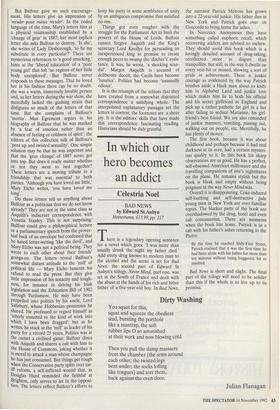In which our hero becomes an addict
Celestria Noel
BAD NEWS by Edward St Aubyn Heinemann, £13.99, pp. 217 There is a legendary opening sentence for a novel which goes: 'I was more than usually drunk the night my father died.' Add every drug known to modern man to the alcohol and the scene is set for Bad News, the second part of Edward St Aubyn's trilogy. Never Mind, part one, was set in the South of France and dealt with the abuse at the hands of his rich and bitter father of a five-year-old boy. In Bad News, the narrator Patrick Melrose has grown into a 22-year-old junkie. His father dies in New York and Patrick goes over on Concorde to bring home the ashes.
In Narcotics Anonymous they have something called euphoric recall, which recovering addicts are advised to eschew. They should avoid this book which is a lovingly detailed account of drug-taking, recollected more in disgust than tranquillity, but still, in the way it dwells on every vein hit or missed, showing a sort of pride in achievement. There is junkie courage as evidenced by the way Patrick brushes aside a black man about to knife him in Alphabet Land and junkie love which makes him lie to both his official and his secret girlfriend in England and pick up a rather pathetic fat girl in a bar after failing to seduce Marianne, his girl- friend's best friend. We are also reminded of junkie manners, vomiting, passing out, walking out on people, etc. Mercifully, he has plenty of money.
The first book, because it was about childhood and perhaps because it had real darkness at its core, had a certain mysteri- ous quality to it. In this book his sharp observations are as good. He has a perfect, self-obsessed American millionaire and the travelling companions of one's nightmares on the plane. He remains stylish but the book is bleak and empty without being poignant in the way Never Mind was.
Overall it is disappointing. Coke-induced self-loathing and self-destructive pale young men in New York are over familiar topics. The blacker parts of the book are overshadowed by the drug, hotel and even cab consumerism. There are moments when the book hits home. Patrick is in a cab with his father's ashes returning to the Pierre:
By the time he reached Sixty-First Street, Patrick realised that it was the first time he had been alone with his father for more than ten minutes without being buggered, hit or insulted.
Bad News is short and slight. The final part of the trilogy will need to be solider than this if the whole is to live up to its promise.
You squat for this, squat and squeeze the obedient stud, bursting the porthole like a mantrap, the soft rubber lips 0 so astonished at their work and now blowing cold.
Then you pull the damp massacre from the chamber (the arms around each other; the twisted legs bent under; the socks lolling like tongues) and sort them, back against the oven door.
Julian Flanagan
Dirty Washing


































































 Previous page
Previous page